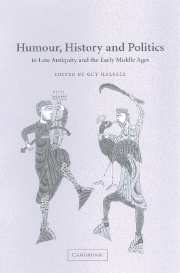Book contents
- Frontmatter
- Contents
- Notes on contributors
- Preface
- List of abbreviations
- Introduction: ‘Don't worry, I've got the key’
- PART I THE FATE OF HUMOROUS WRITING
- PART II HUMOUR AND THE POLITICS OF DIFFERENCE
- 3 The lexicon of abuse: drunkenness and political illegitimacy in the late Roman world
- 4 Funny foreigners: laughing with the barbarians in late antiquity
- 5 Liutprand of Cremona's sense of humour
- PART III HUMOUR, HISTORY AND POLITICS IN THE CAROLINGIAN WORLD
- Index
3 - The lexicon of abuse: drunkenness and political illegitimacy in the late Roman world
Published online by Cambridge University Press: 24 July 2009
- Frontmatter
- Contents
- Notes on contributors
- Preface
- List of abbreviations
- Introduction: ‘Don't worry, I've got the key’
- PART I THE FATE OF HUMOROUS WRITING
- PART II HUMOUR AND THE POLITICS OF DIFFERENCE
- 3 The lexicon of abuse: drunkenness and political illegitimacy in the late Roman world
- 4 Funny foreigners: laughing with the barbarians in late antiquity
- 5 Liutprand of Cremona's sense of humour
- PART III HUMOUR, HISTORY AND POLITICS IN THE CAROLINGIAN WORLD
- Index
Summary
INTRODUCTION
In the anonymous, mid-fourth-century narrative known as the Origo Constantini imperatoris (The origin of the emperor Constantine), several apparently remarkable statements are made about the moral fibre – or, more precisely, the lack of it – of the enemies of the emperor Constantine. Prominent among these villains are Galerius, Augustus of the eastern empire (305–11), and his short-lived associate as western emperor, Severus (Caesar, 305–6; Augustus, 306–7). The relationship between the two men, so our anonymous author has it, was based on their shared propensity to heavy drinking: ‘Severus Caesar was ignoble both by character and by birth; he was a heavy drinker [ebriosus] and for this reason he was a friend of Galerius.’ Galerius’ own fondness for drink and its deleterious effects are soon described: ‘Galerius was such a heavy drinker [ebriosus] that, when he was intoxicated, he gave orders such as should not be implemented.’
This chapter will explain why it is significant that an emperor should be characterised as an ebriosus. It will show that emperors described in this fashion were not ‘mere’ heavy drinkers, but that allegations of drunkenness were employed to undermine the very legitimacy of their rule. The discussion here focusses primarily on texts dealing with emperors of the tetrarchy established by Diocletian and the succeeding Constantinian dynasty, so that the material will cover both the political and religious rivalries of the late third and early fourth centuries ad.
- Type
- Chapter
- Information
- Publisher: Cambridge University PressPrint publication year: 2002
- 1
- Cited by

